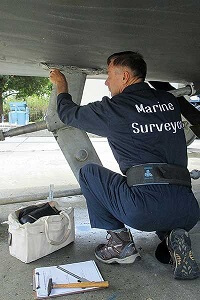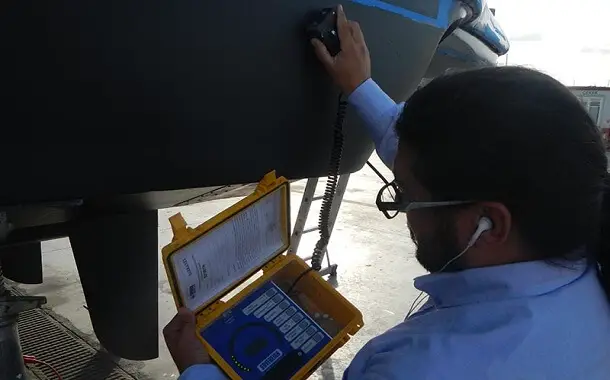How Much Does a Boat Survey Cost?
If you are thinking about buying or selling a yacht or a sailboat, you will need to hire a boat surveyor to evaluate this large vessel in order to understand its true value. In this article, we are going to talk about the costs of a boat survey and what you need to know when making such an acquisition.
How Much Does A Boat Survey Cost?
The cost of a boat survey varies widely and depends on the type of boat that is evaluated (yacht, sailboat, or other type of boat). Also, the total cost of a boat survey is affected by factors such as the age, condition, and location of the boat. In general, you will have to pay $28 to $55 per foot for a boat survey, while for a yacht the price can easily go higher than $500 per foot.
In the table below you will find the average costs per foot for a boat survey for different types of boats.
| Boat Type | Cost of a Marine Survey (Per Foot) | Average Length (Feet) | Typical Survey Duration (Hours) |
|---|---|---|---|
| Sailboat | $25-$50+ | 25-55 | 4-8 |
| Pontoon Boat | $15-$25+ | 16-30 | 2-4 |
| Fishing Boat | $15-$25+ | 14-24 | 2-4 |
| Yacht | $100-$500+ | 40-150 | 6-12 |
| Catamaran | $25-$50+ | 30-65 | 4-8 |
| Speedboat | $25-$50+ | 15-30 | 3-6 |
| Dinghy | $5-$10+ | 6-12 | 1-2 |
These costs depend greatly on the location. For instance, if you are living in Los Angeles, California you will spend much more for a boat survey than if you were to live in the middle of Missouri.
Though, it is recommended to add this cost into your buying budget because specific surveys evaluate all vital parts of the boat like the hull composition and electrical systems. This service is worth the cost as you will have the peace of mind that your boat is secure and safe.
Why do I need a boat survey?
It would be beneficial to get a boat survey if you are considering a boat purchase or boar ownership. This will help both boat purchasers and owners to get a detailed description of the boat before making a decision.
You might also like our articles about the cost of boat transportation, boat bellow replacement, and boat rewiring.
Usually, a marine survey includes the inspection of the boat’s electrical systems, hull, propulsion system, interior and exterior. Plus, this survey is made by a professional boat surveyor who has experience in boat repairs and building. Also, he/she has knowledge about maritime law that offers legal protection for boat purchasers and boat owners.
Finally, you will be able to save money and avoid unanticipated issues in the future if you get a pre-purchase survey.
What does a boat surveyor look for during the inspection?
When doing a boat inspection, a surveyor will analyze very carefully the parts of the boat like the engine, rigging, and the hull, to make sure they are in good condition. Also, all the safety gear, which is on board will be reviewed to make sure it meets the industry standards.
Based on these findings and evaluations, the professional will be able to offer their opinion on the market value and overall integrity of the boat.
How to prepare the boat before a survey?
If you want to sell your boat, you should make sure you have in order and up-to-date all the necessary paperwork. This includes engine, registration, and safety certificates. Also, you should take the time to add any extra documents about upgrades or past maintenance.
After organizing all documents, take a look on board and check it for any clutter that may impair the inspector’s/surveyor’s access to specific areas. Also, make sure that all engines and systems related to navigation or communication are working properly. Plus, make an inventory of all onboard equipment.
By doing all of these before the marine surveyor arrives, you will create a professional impression and make the process easier.
What can a boat surveyor find during an inspection?
 In general, boat surveyors may find deck damage, cracked hulls, engine issues, and others during an inspection. Usually, buyers don’t pay attention to the repairs needed for the rigging and this can reduce the value of the boat significantly.
In general, boat surveyors may find deck damage, cracked hulls, engine issues, and others during an inspection. Usually, buyers don’t pay attention to the repairs needed for the rigging and this can reduce the value of the boat significantly.
Also, the overall price can be decreased by any damages that must be repaired before intending to resell the boat.
It is recommended to anyone who wants to sell or buy a boat to firstly resolve any engine issues, verify that all parts of the boat are in good condition, and check for cracks. By doing this both parties, the seller and buyer, will get the desired results.
How long does the boat survey last?
In general, a survey is considered valid for one or two years, depending on the areas in which it was completed and when it was issued.
When talking about the longevity of a boat survey, this depends on your specific situation. For instance, it is recommended to contact a qualified surveyor if you want to buy an older boat. You can search online for a boat surveyor by location and years of experience. Also, take into consideration the client reviews when deciding which one to choose.
Important things to consider
Make sure you have your boat inspected periodically by a professional as this is incredibly beneficial and important. While the longevity of any boat depends on regular maintenance and safety checks, the peace of mind while riding the sea is given by a professional inspection of the boat.
Also, this survey will ensure that all operation systems of the boat, like the safety devices and electrical systems, are working according to the marine safety rules.
Moreover, a professional boat survey will help you avoid any expensive damage in the future, that may appear due to undetected problems such as cracks in the structure or moisture in the hull, that could seriously affect the performance or safety of the boat.
Final words
It is very important to get a boat survey from time to time to make sure you are keeping your family safe while sailing away. Also, this is a crucial step when selling or purchasing a boat as the surveyor will offer an approved opinion regarding the value and condition of the boat. It may be a little expensive but is worth the cost because it will help you avoid costly repairs in the future.


Leave a Reply
Want to join the discussion?Feel free to contribute!